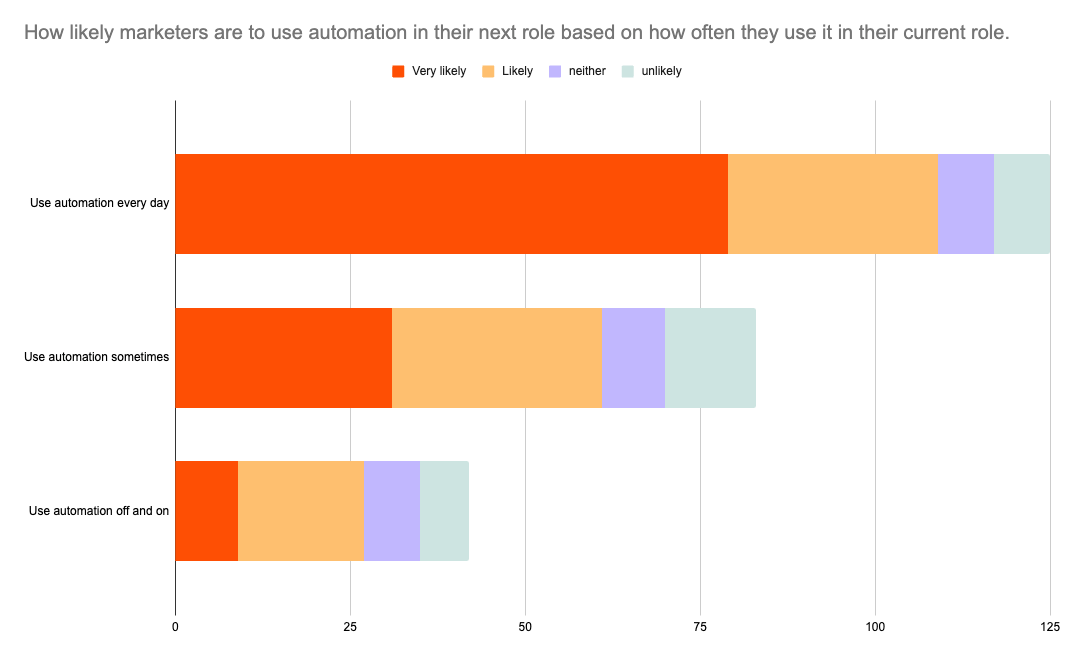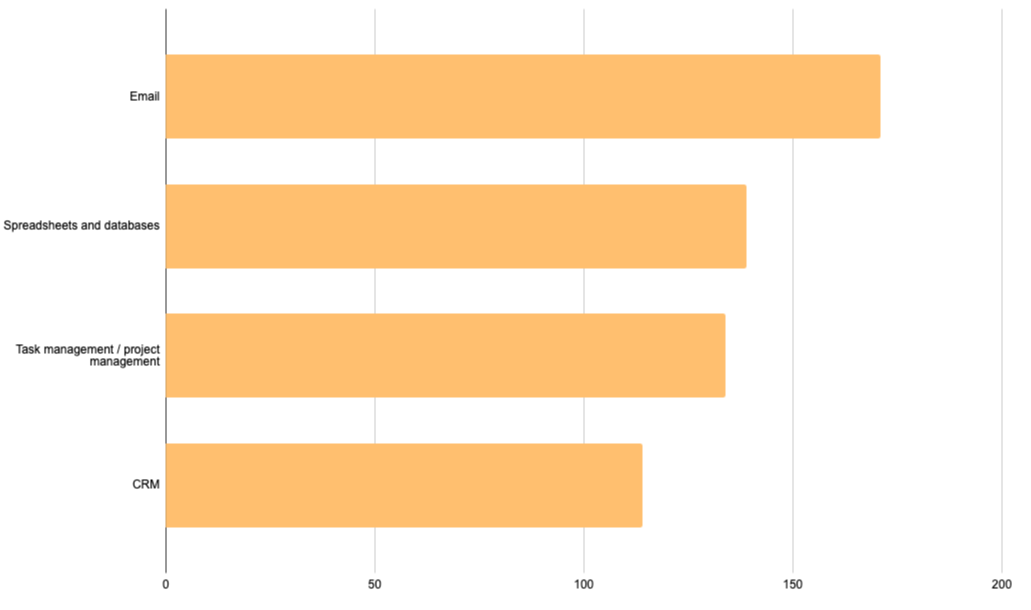Marketing moves fast. Trends change. Best practices constantly evolve. And as a marketer, you’re always paying attention. (So is your competition.)
You also wear many hats at work—from project management and strategy to operations and data analysis. That often means your efforts are spread thin. When your focus is everywhere, it has a ripple effect. It might take longer to achieve your marketing goals and move your business forward.
So, you work harder. Maybe you put in extra hours. And eventually, you burn out. Because you know marketing is forever evolving, and you have to keep up.
But it’s not all doom and gloom. More and more workers—especially marketers—are offloading business-critical processes to computers. And we’re not just talking about the basic automation features built into your existing marketing tools. We’re talking about automating entire processes crucial to your work, from tracking your first lead to putting together that final report on campaign performance.
While marketing is dynamic, automation keeps you ahead of those changes—without needing to wear yet another hat. Automation frees up time for marketers like you to focus on strategic and creative work best suited for humans.
That might sound daunting, but it’s achievable with the right tools. How do we know? We heard from marketers who are frequent-flier automators already doing exactly that. And you can, too.
In our benchmark report, you’ll learn:
-
How many of your peers are using marketing automation.
-
How marketers benefit from automation—professionally and personally.
-
What your peers are automating.
-
And most importantly, how you can start automating your business-critical processes and see immediate results—whether you’re a marketing team of one or 100.
Our methodology
Table of contents:
How often marketers automate their work
It’s not hard to find marketers already using automation in some capacity. After all, many of the tools marketers use often have some automation built in. (Think features that allow you to schedule email sends.)
So, the real question is: How frequently are your peers using automation?
In a survey of 250 marketers (Source 2) who use automation, 50% say they use it daily. About a third (33.2%) use automation sometimes, while the rest (16.8%) use it on and off. Everyone who uses automation is more likely than not to use it in their next role. However, those who used automation more frequently were significantly more likely to keep using it.

It makes sense. Once one task is automated, marketers find more ways to streamline their work.
“There are ways to work more efficiently, and busywork [doesn’t have to be] a necessary evil,” says Tim Tieu, Global Customer Marketing Manager at Asana. His team uses automation to help power their customer advocacy programs.
“[Busywork] is something you can automate, so you can focus on what you’re good at and what you enjoy.”
As a result, daily users continue using automation at their next job because it’s become an indispensable tool.
Why are marketers using automation?
Marketers lean on automation for a variety of reasons. But before we dig into what keeps them coming back for more, let’s look at why marketers start using automation in the first place.
Top five reasons marketers use automation:
-
Save time
-
Increase productivity
-
Improve organization
-
Help them compete with larger companies
-
Free up time for more creative tasks
Source 2: June survey
The top two answers are not a surprise. Automation takes care of tasks for you (“Save time”) so you get time back to focus on other things (“Increase productivity” and “Free up time for more creative tasks”).
But let’s take a closer look at reasons three and four:
-
Improve organization: Marketers use a number of tools for work—including project management apps, software for lead generation and management, spreadsheets for data analysis, and more. Since they use many of these tools for campaigns in one way or another, these apps need to talk to each other.
-
Help them compete with larger companies: Marketers often have to do more with less, whether that’s time, a limited budget, or a smaller team. This is especially true for small businesses, which may have a marketing team of one (or only a few). Automation helps these small teams take care of business-critical, yet time-intensive tasks so they can use their limited time to focus on the most impactful work.
The benefits of using automation
Once marketers start using automation, how does it pay off? Here’s what marketers said about the professional benefits:
|
Professional benefit |
Percent cited |
|---|---|
|
Increased confidence at work |
34.8% |
|
Received a raise |
34.4% |
|
Reduced errors at work |
33.2% |
(Source 2)
More than a third (34.8%) of marketers were more confident at work because of automation. We can make a few educated guesses why:
-
Fewer functions to manage: Marketers don’t have to wear as many hats if automation can take care of some of them. That also means their focus isn’t spread as thin.
-
More time for strategic (and enjoyable) tasks: If automation takes care of business-critical processes, marketers can focus on the work they enjoy—such as bigger-picture, strategic tasks.
-
Quality of work increases: Marketers can fully focus on those strategic tasks and do their best work when automation frees up their time and shortens their to-do list.
That would also help explain why these marketers also received a raise (34.4%) and reduced work errors (33.2%).
Now, what about the personal benefits of automation? Here’s what we learned:
|
Personal benefit |
Percent cited |
|---|---|
|
I feel less burnout at work. |
48.8% |
|
It improved mood and overall happiness. |
37.2% |
|
It reduced my stress. |
34.8% |
Source 2: June survey
Almost half (48.8%) of marketers said they feel less burnout at work because of automation. That’s huge. It’s also worth noting that “less burnout” is 10 percentage points higher than the second-place answer, “improved mood and overall happiness” (37.2%).
Another fun stat: 31.2% of marketers said they were more likely to take a vacation due to increased productivity. That indicates marketers who use automation feel more comfortable taking time off without worrying about any tasks falling through the cracks in their absence.
Source 2: June survey
What marketers automate
Marketers experience greater personal and professional satisfaction when they start using automation. How did they get there? Let’s look at what they’re automating.
We’ll cover the tasks marketers commonly automate, the apps they spend the most time in, and the things they wish they could automate.
Top time-intensive tasks marketers automate
First, let’s talk about the kinds of tasks marketers automate. Here’s what your peers said:
-
Messaging leads or customers. (Source 2)
-
Sharing customer or lead information with their team. (Source 2)
-
Copying and pasting data. (Source 1)
-
Keeping up with meetings, events, and appointments. (Source 2)
These tasks have a few things in common:
-
Frequency: Marketers perform these tasks regularly.
-
Multiple apps: These tasks often involve more than one tool.
-
Standard processes: It’s done the same way each time.
-
Priority: While these tasks are routine and don’t require higher-order thinking, they’re also critical for business operation.
-
Time-intensive: The tasks above take up a lot of time because of how frequently marketers have to do them.
It’s also interesting that the top task marketers automate—”messaging leads or customers”—is a task that is arguably the most business-critical and time-intensive on the list. You could say the same for any of the tasks on this list, but a business can’t function without leads or customers.
This shows that automation isn’t just for small, one-off tasks. You can trust automation to handle the crucial processes that keep your business running and help you manage the tasks that eat up your time.
Top time-intensive apps for marketers
If you’re spending a lot of time in a particular app, it’s worth evaluating if you can automate some of the routine tasks you perform in that tool. That’s why we asked marketers which apps they spend the most time in. (Source 3)

Without a doubt, marketers spend the most time in email (28%). Since team chat was much lower (5%), this indicates that marketers are using their email time for external, business-critical communication.
Spreadsheets and database apps came in second (23%), followed by project and task management apps (22%).
Tasks marketers want to automate
Marketers often have items on the back burner that they’d like to remove from their to-do lists, but just haven’t gotten around to it yet.
We asked your peers about what work they wish they could offload to a computer. (Source 3)
|
Tasks to automate |
Percent cited |
|---|---|
|
Tracking information and data entry |
30% |
|
Lead management |
28% |
|
Managing projects or tasks |
25% |
Data entry and tracking information is the top task marketers would rather leave to a computer. However, lead management was a close second, and managing projects or tasks weren’t far behind.
Note that these tasks directly correlate with the apps marketers spend the most time in—email, spreadsheets, and project/task management. That shows that marketers know there’s a better use for their limited time.
And here’s the good news: These are all tasks that automation can take care of!
Start automating now
You know that your peers are using automation to achieve their marketing goals—and reaping major professional and personal benefits. You can do the same!
But it’s hard to know where to start. (You’re wearing all those hats, after all.) Use this checklist as a starting point to evaluate your automation efforts—based on how your peers are already using automation—and discover ways you can level up.

What makes a task good for automation?
-
It happens on a schedule.
-
It involves moving information between apps.
-
It’s repetitive and done the same way each time.
Get started with marketing automation
Lead management
Automate every step in your lead funnel, from initial contact to that final team handoff.
Manage projects or tasks
Streamline your project logistics, from collecting research and assigning tasks to managing campaign kick-offs and events.
Track information or enter data
Automatically create detailed customer profiles, track performance metrics, and spend less time on data entry.
Automation to move your marketing forward
The message is clear: More and more marketers are turning to automation to stay ahead of industry demands.
To recap:
-
Half of marketers use automation every single day. And they’re more likely to keep using it at their next gig.
-
Marketers use automation to save time, increase productivity, and stay organized.
-
Marketers who use automation experience less burnout and feel more confident at work.
-
Marketers frequently use automation to message leads or customers, share lead information with teams, and copy and paste data.
Automation helps marketers like you improve work performance, hit those business goals, and achieve personal and professional satisfaction. And now, you have the tools to get there, too!
Data sources
-
Zapier surveyed 2,000 knowledge workers in March 2021 on whether or not their company uses workflow automation tools. Knowledge workers came from businesses with less than 250 total employees. 178 respondents stated they worked in marketing. Responses were random, voluntary, and completely anonymous.
-
Zapier surveyed 1,500 knowledge workers in June 2021 about their automation usage—regardless of the automation tool they used. These knowledge workers came from small-to-medium-sized businesses across the U.S., working in marketing, IT, accounting, human resources, and sales/customer services. 250 respondents identified as marketers. Responses were random, voluntary, and completely anonymous.
-
Zapier created a quiz to help people find a task to automate. Between Sept. 2021 and early August 2022, 622 marketers took the quiz.
[adsanity_group align=’alignnone’ num_ads=1 num_columns=1 group_ids=’15192′]
Need Any Technology Assistance? Call Pursho @ 0731-6725516







